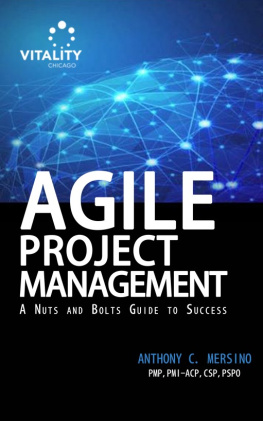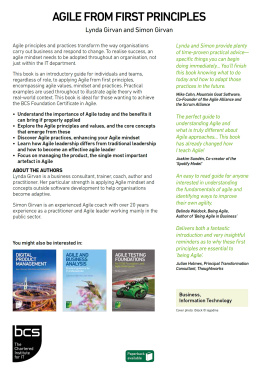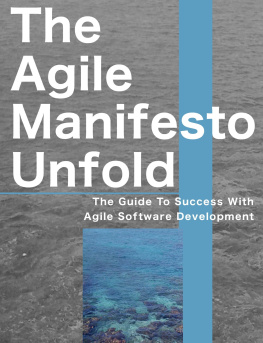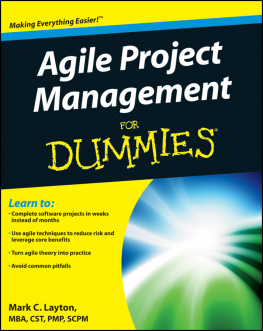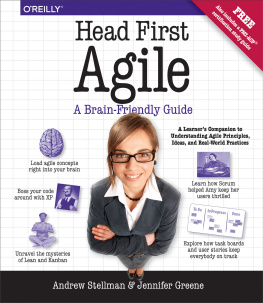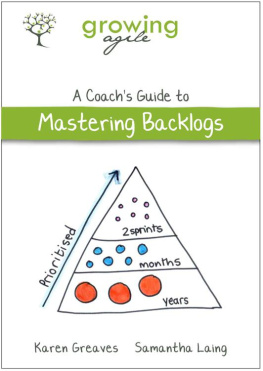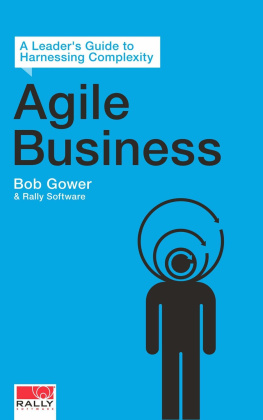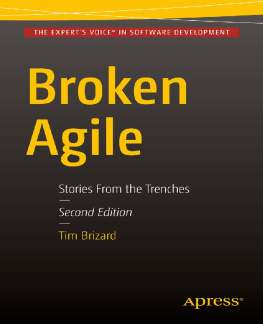I want to thank Gustav Bjorkeroth, Alex Clark, Geof Ellingham, Alan Gedye, Kenny Grant, Dimitar Karaivanov, Richard Kok, Theresa McGouran, Phil Moore, Eileen Roden, Virpi Rowe, Emil Schnabel, Lindsay Scott and Tanya Ward, for their feedback and for the time that they invested in helping me to either prove tools and concepts or help me to write this book. I could not have done this without you.
Introduction
Since the publication of the manifesto, agile, has been treated by some as if it is merely a process. It seems as if there is a widely held belief that once people are trained or certified, suddenly, they are agile! Why is it then that once trained, and agile is simple in context, that people struggle and organisations fail, to realise the anticipated benefits of an agile culture? Why is it so hard? Whats missing? The answer appears to lie in the area of coaching, that is taking the theory the books and training then applying these concepts in the reality of real work, delivering solutions for customers.
Getting good results with agile seems relatively straightforward: form a cross-functional team, prioritise work items in the form of a backlog, concentrate on small batch sizes and flow, create a potentially shippable product or customer value in each iteration. Et voil! No surprises for the reader here? However, getting results genuinely great results, consistently from agile teams is a little more complicated.
Realising results which consistently excite senior executives, requires a great team with good working practices and a supportive ecosystem. As in sports, great teams rarely simply happen. Like great athletes, great teams are coached, shaped, challenged and conditioned over time. A sports team aspiring towards greatness needs a coach: trained, experienced and competent in their craft. The same is true of their agile team counterparts.
Great agile coaches have a desire, a passion, to help people and teams go further than they ever went before. These coaches listen and also continually develop themselves so that they are real wizards in their craft.
This book is an attempt to place into the hands of agile coaches, the practitioners a series of recipes, some tools and techniques which will help them in their quest to build agile capabilities in organisations. Once they have become an agile leader, agile coaches or consultants tend to operate at three levels; Team enablement where coaching is focused on a single team potentially as a Scrum Master role or similar. Agile Coaching where a coach may be working with several teams in a programme or department. Or Enterprise Agile Coaching is a consulting activity where a coach is involved or leading an organisational transformation. All these levels require a different but incremental skill set, yet all have the foundation in the self-awareness and knowledge of personal limitations of an agile leader.

The layers of agile coaching
The book starts with outlining approaches, or recipes, which enable agile coaches to be leaders. Able to react to situations and to measure their success. It sets out some of the organisational prerequisites for agile adoption. Then it progresses through the coaching of teams to the programme level; covering the challenges of scaling agile for more substantial activities. The last section of the book is for Enterprise Agile Coaches or Consultants. It considers the planning, execution and control of agile transformational activities. It covers the identification and resolution of organisational anti-agile practices.
Formatted as a series of recipes for successful coaching. This book is not a definitive work; its a minimum viable product; there will be further iterations. The contents are the result of working through several successful agile transformations and learning as I go.
With transformational success comes a sense of achievement which for many may become career-defining! This sense of lifetime achievement is real for me! I wish the reader the same sense of accomplishment and continued learning during their agile journey.
In working in several organisations and many teams, I have established a mantra which I share.

The goal of this cookbook is to give the agile coach; factors to consider, some recipes, some tools and some pointers towards success which include both metrics and quality.
How to Use This Guide
Much of what makes agile work really work, are the beliefs, the values and the ecosystem in which the agile team operates. The beliefs centre on dissatisfaction with traditional ways of working and a certainty that better ways can always be found. The values focus on the treatment of human beings as skilled individuals who understand their craft. The ecosystem is the combination of training, processes and tools that enable agile teams to deliver solutions as efficiently as possible and the system which allows organisations to adapt to changing circumstances quickly. The combination of beliefs, values and ecosystem enable organisations through their agile teams to respond to the sudden shifts in market conditions, the development of game-changing technologies or the actions of competitors.
Most agile teams use Scrum or Kanban to deliver high-quality solutions quickly, but it is more, its also about the quality of the solution. In producing results rapidly, agile can be complemented with established practices of project, programme and portfolio management, quality assurance and control and change management. While agile is comparatively new, the agile coach would be ill-advised to ignore all the wisdom embedded in these traditional approaches. Inevitably, therefore, in my view, the skilled agile practitioner, may use tools and techniques from as many sources as appropriate to support their activities. I firmly believe that obsessively using only agile methods is unnecessary and potentially career-limiting for a coach. Instead, I see that many of the practices used in traditional solution delivery have applicability and can also add value in an agile context.


